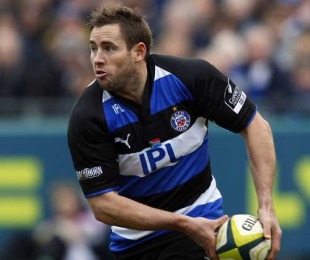|
Comment
Boks falling out of love with Europe?
Stephen Nell
February 14, 2011

Bath fly-half Butch James will be heading home to South Africa at the end of the northern hemisphere season to link up with the Lions
© Getty Images
Enlarge
It was intriguing recently to hear that South African players are increasingly falling out of love with the notion of playing in Europe when they are still in the prime of their careers. Springbok centre Jean de Villiers told me just recently that people would be surprised by how many top Springboks aim to stay in South Africa after this year's World Cup in New Zealand. This was confirmed in a chat with South African Rugby Players' Association (Sarpa) chief executive Piet Heymans. His take on it was that a deal negotiated by Sarpa with the South African Rugby Union (Saru) for use of the players' image rights had significantly bolstered the players' earning potential. According to the deal, all Springboks share in the financial windfall from appearances in commercials etc. In most cases this renders the difference in earnings between South Africa and Europe insignificant. The bulk of the money goes to the more marketable internationals that are frequently used for appearances, but in keeping with the spirit of rugby, there is also recognition that the entire team contributes to an individual's success. Even the less marketable Test players are therefore remunerated. Agent Chris de Beer's view on the issue was that the exchange rate had strengthened in the South African rand's favour. This would make players even more reluctant to leave home comforts for the sake of earning pounds or euros. Furthermore, a new big player has entered the South African market in the form of the Golden Lions Rugby Union. Or, should I rather say, the slumbering giant has awaken and found itself wealthy equity partners in businessmen Robert Gumede and Ivor Ichikowitz. The Lions initially struggled to make major signings, but the pending arrival of Butch James from Bath suggests that they are prepared to get their cheque books out. Rumour has it that Racing Metro's Frans Steyn and Ulster's BJ Botha are also on the shopping list. Inevitably, there has been a knock-on effect, which will mean that the Blue Bulls, Western Province and Sharks will be forced to hike their contracts. The Southern Kings, who are due to participate in Super Rugby from 2013 onwards, will also enter the big time with a fat cheque book. They are politically connected and sponsors are standing in line to come on board. Of course, there will still be many players that head overseas. Not only is the money good, but there is the opportunity to experience something different and quite often those spells away do a player the world of good. Percy Montgomery, for example, returned to South Africa a better player, while Luke Watson really was in need of a break from the political shenanigans that surrounded his every move in South Africa. The other benefit highlighted by Southern Hemisphere players is that the travel is significantly less in Europe. The fact that they fly in and out of venues for games on weekends is a massive factor for those who have young families. What we may well see is that South Africa are no longer under so much pressure to hold onto the next big thing. An example is the big-money deal that took Steyn to Racing Metro. More likely we will see players in the twilight of their careers or those that suspect they are no longer in the Bok picture to pack their bags. On the flip side, we will see others returning, as James has done. In the coming months there are likely to be many headlines about an anticipated player exodus, but it won't be anything South Africa can't handle. The country remains an astounding source of playing talent and is likely to succeed in retaining its very best players for the foreseeable future. Meanwhile, Super Rugby kicks off this coming weekend with a new format, which boils down to a lot more derby matches. It will be interesting to see how audiences take to the new format, though the obvious fear is that there will be derby overkill. South Africa also have the Currie Cup, which is passionately supported, though there are fears about the effect of Super Rugby on the domestic calendar in a non-World Cup year. Super Rugby will end on the first weekend of August in a non-World Cup year, leaving Saru with a situation whereby they have to fit the league phase of the Currie Cup into 10 weeks. The sensible thing to do would then be to slash the number of Premier League teams from eight to six from 2012 onwards, though the horse has probably already bolted because there is no relegation mechanism in place this year. So it really will be interesting to see what pans out at Saru on this very important issue. © ESPN Sports Media Ltd.
|
Live Sports
Communication error please reload the page.
-
Football
-
Cricket
-
Rugby
-
- Days
- Hrs
- Mins
- Secs
F1 - Abu Dhabi GP
Abu Dhabi Grand Prix December 11-131. Max Verstappen ()
2. Valtteri Bottas (Mercedes)
3. Lewis Hamilton (Mercedes)
4. Alexander Albon ()
5. Lando Norris ()
6. Carlos Sainz Jr ()
-
ESPNOtherLive >>
Snooker - China Open
Tennis - Miami Open

